Based on the autobiographical novel by the late Makoto Takayama, Egoist is a deeply moving Japanese LGBTQ+ drama directed by Daishi Matsunaga. The film follows fashion editor Koichi (played by Ryohei Suzuki), who loses his mother at 14 and later builds a life in Tokyo wrapped in designer labels and emotional detachment. That is, until he meets Ryota (played by Hio Miyazawa), a younger man unaware of his own beauty, which leads Koichi to slowly dismantle his self-protective façade and confront the meaning of love—and the boundaries of selfishness.
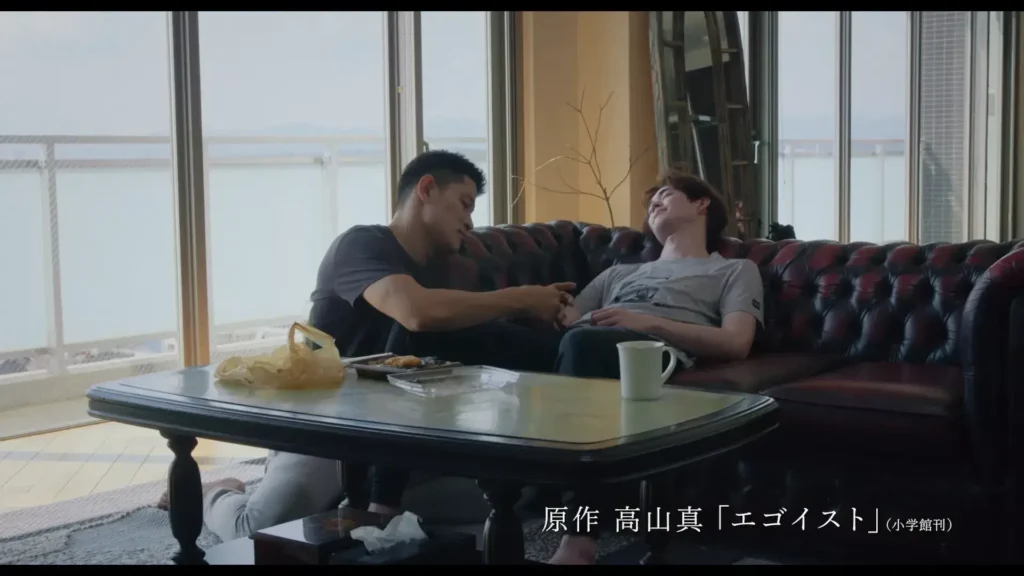
While many queer films rely heavily on romance or identity crises, Egoist does something different: it gently fades queerness into the background, instead focusing on universal themes of connection, guilt, and emotional redemption.
Egoist Official Trailer
Egoist Summary | |
|---|---|
| Title: | Egoist (エゴイスト) |
| Series Info: | Japan (2022) |
| Length: | 92 minutes |
| Is Egoist BL? | Yes, there's a BL romance. |
| Genre: | Romance, Drama, Boy's love |
Plot
Koichi, a successful fashion editor wrapped in the glitz of LV and Prada, meets Ryota, a part-time trainer supporting his ailing mother through sex work. Their initial chemistry grows into an emotionally complicated relationship. Koichi offers Ryota financial support in exchange for leaving escort work, but the amount—20,000 yen a month—is far from enough.
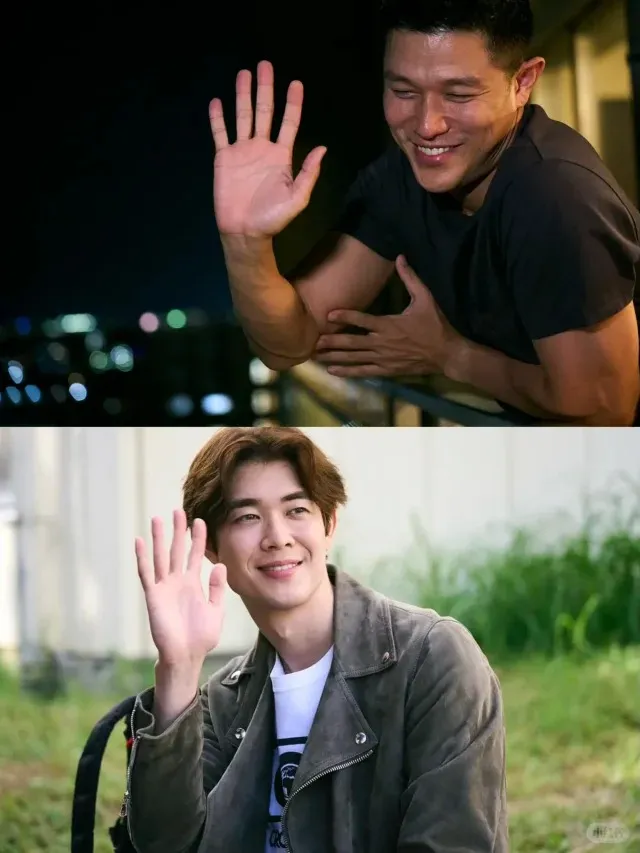
Ryota overworks himself with physical jobs, and tragically dies from exhaustion. What follows is Koichi’s deep spiral into guilt, his attempts to care for Ryota’s mother, and a journey of self-reflection about the nature of love, loss, and what it means to truly give.
Rather than drawing sharp lines between egoism and altruism, the film challenges viewers to see how love, when mixed with guilt and desire for control, becomes both redemptive and flawed.
Egoist Cast
Charactor

A fashion editor haunted by his mother’s early death, Koichi uses luxury and performance as a shield until Ryota awakens a different side of him. His love is complicated—filled with genuine care but also need for control.
Suzuki Ryohei
Ryohei is a celebrated Japanese actor known for his emotive versatility. In Egoist, he delivers a subtle but powerful performance, particularly in emotionally heavy scenes like the seaside phone call or the funeral breakdown. His past works include Tokyo MER, Baragaki, and Segodon.

A soft-spoken young man caring for his ill mother by working as a host. His willingness to leave that life for Koichi speaks to a deep yearning for love and stability, though ultimately it costs him everything.
Miyazawa Hio
A rising star in Japanese cinema, Hio brings delicate masculinity to his roles. He previously appeared in His (2020), another LGBTQ-themed film, and has become a recognizable face for emotionally honest, vulnerable characters.
Director
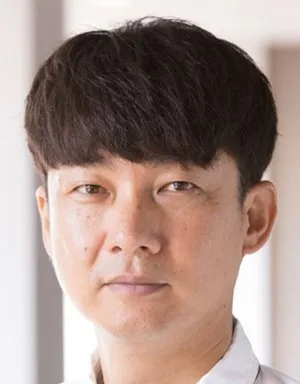
Daishi Matsunaga
Daishi Matsunaga (松永大司) is a Japanese director known for his sensitive and introspective storytelling, often blending documentary-like realism with quietly emotional narratives. Before Egoist, he gained attention with Pieta in the Toilet (2015), and the Netflix mini-series Tokyo Love Hotel. Matsunaga’s directorial style favors long takes, subtle emotional beats, and a deliberate pacing that allows the audience to reflect on character psychology rather than simply follow plot points.
MOVIE HIGHLIGHT
Based on Makoto Takayama’s autobiographical novel
Ryohei Suzuki nominated for multiple Best Actor awards
Hio Miyazawa won Best Supporting Actor at the Asian Film Awards
Egoist Review
Review
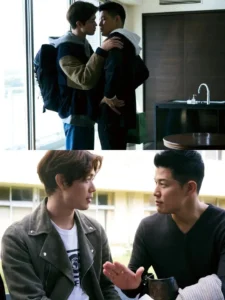

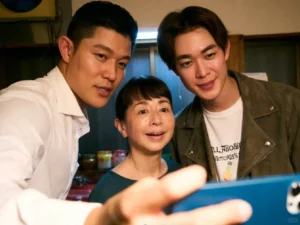
⭐ Story – 4.0 / 5
At its heart, Egoist is not just a gay love story—it’s a quiet psychological drama that explores the blurred line between affection and possession. What begins as a romance between Koichi, a middle-class fashion editor, and Ryota, a working-class caregiver, gradually reveals deeper tensions around class, control, and the longing for maternal connection. The film’s brilliance lies in how it avoids framing queerness as conflict; instead, it normalizes it and shifts the narrative tension toward questions like: What does it mean to love someone for who they are—not for what they give us?
While the story is emotionally resonant, the pacing stumbles in the second half. Ryota’s sudden death feels both shocking and symbolically powerful, but the aftermath sometimes lacks narrative cohesion. Still, this is a rare queer film that dares to ask moral questions without demanding clear answers.
⭐ Acting – 5.0 / 5
Ryohei Suzuki delivers a masterclass as Koichi—layered, heartbreaking, and beautifully restrained. His emotional arc, from quiet yearning to guilt-ridden self-reckoning, is portrayed with stunning precision. Just watch the funeral scene, or his trembling attempt to stand, or the raw devastation in front of the mirror—all deeply human, all unforgettable.
Hio Miyazawa’s Ryota may seem simple on the surface, but his performance quietly builds over time. The exhaustion in his body, the kindness in his gaze, the subtle strength in his silence—it all adds up to a deeply empathetic portrayal of someone forced to grow up too fast. Together, their performances elevate the film into something far more intimate than a typical romance.
⭐ Chemistry – 4.0 / 5
Suzuki and Miyazawa’s chemistry is not fiery or flirtatious—it’s raw, tentative, and at times unbalanced. But that’s exactly what makes it believable. The sex scenes are emotionally rich, almost painterly in their restraint. They aren’t about lust—they’re about permission, curiosity, and fear.
Interestingly, their connection feels strongest in bed, where power dynamics dissolve into quiet vulnerability. But in day-to-day life, Koichi’s emotional guardedness and Ryota’s exhaustion create a subtle friction. It’s not traditional “couple chemistry,” but it’s honest and aching in its realism.
⭐ Production – 4.0 / 5
The cinematography is calm and minimal, allowing long takes and silence to do most of the emotional work. The framing of Koichi’s back, Ryota’s sleeping figure, or the careful movement of hands—all convey intimacy without excess.
The use of visual contrasts—Koichi’s luxury fashion against Ryota’s utilitarian work clothes—adds another layer of unspoken commentary. Sound design is sparse but intentional, with moments of silence speaking louder than score. The film’s slow pacing and naturalistic lighting reflect Japanese cinematic restraint, though some emotional transitions feel slightly abrupt in the edit.
⭐ Ending – 3.0 / 5
The ending is emotionally soft but morally unresolved. Koichi’s shift from lover to caretaker for Ryota’s mother feels redemptive, but also evasive. The film’s message—“Even if you don’t know what love is, if it felt like love, that’s enough”—is poetic, but avoids deeper accountability.
Ryota’s death by overwork is haunting, but the film chooses not to explore the socioeconomic or ethical weight of that tragedy. Instead, it wraps Koichi’s guilt in a blanket of emotional forgiveness. For some viewers, that might feel healing. For others, it’s a missed opportunity. The ending lingers, but not always in the way it hopes.
Egoist Information
Awards
🏆 Ryohei Suzuki was nominated for Best Actor at the 47th Japan Academy Film Prize for his performance in Egoist
🎬 Egoist, directed by Daishi Matsunaga, was selected for the Competition Section and nominated for Best Picture at the 35th Tokyo International Film Festival
🏆 Ryohei Suzuki also received a Best Actor nomination at the 16th Asian Film Awards
Where to Watch
Related Links
Explore More BL Content
